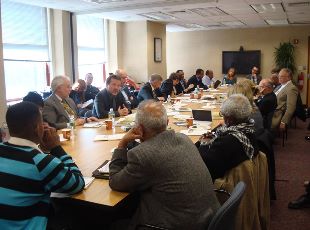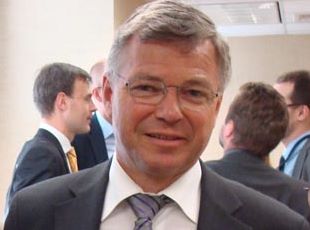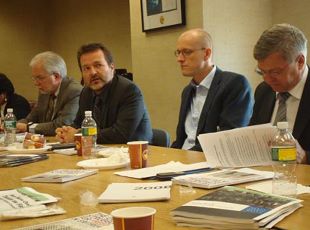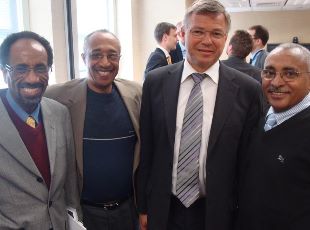The Oslo Center & Human Rights Watch Joint Presentation
 The Oslo Center for Peace and Human Rights Watch presented “The Lasting Struggle for Freedom in Eritrea” to several diverse groups of people including members of the United Nations, UN mission, Committee to Protect Journalists, Eritrean Civic Society and other individuals.
The Oslo Center for Peace and Human Rights Watch presented “The Lasting Struggle for Freedom in Eritrea” to several diverse groups of people including members of the United Nations, UN mission, Committee to Protect Journalists, Eritrean Civic Society and other individuals.
Georgette Gagnon, Executive Director of the Africa Division of Human Rights Watch in her opening statement said Eritrea is a country where a very repressive regime continues to commit serious human rights violations, because of whole host of reasons these violations have not been seriously addressed by the international community. Ms. Gagnon said, “We at the Human Rights Watch are going to change that” we have issued an extensive human rights violations report, “Service for Life: State Repression and Indefinite Conscriptions in Eritrea” in April, which is getting a lot of attention through out the international community. 
Mr. Kjell Magne Bondevik, founder and president of the Oslo Center for Peace and Human Rights, stated the people of Eritrea as well as the international community had great expectations when President Isaias assumed power in 1991. We had high hopes when he promised to lead the youngest state of Africa on the path to democracy and human rights. Our hopes from eighteen years back is in glaring contrast to today’s Eritrea; one of the most violators of human rights and abusive regimes in the world.
In addition to Mr. Bondevik, other Staff members of the Oslo Center Hans Petter Bergli and Simon Rye stated that Eritrea is one of the most isolated countries in the world, dictatorial regimes benefits form isolation and President Isaias has proven to be a master in both isolating him self and at quelling people into silence.  We need to break the silence and quickly end the isolation, we must find ways to engage with the regime and we need a broad based political dialog that addresses the relationship with Ethiopia and insist on implementing the finial and binding decision of the boarder commission. Solving the border issue would not necessarily mean we will have unequivocal human right situation in Eritrea however it will not be used as an excuse for farther isolation.
We need to break the silence and quickly end the isolation, we must find ways to engage with the regime and we need a broad based political dialog that addresses the relationship with Ethiopia and insist on implementing the finial and binding decision of the boarder commission. Solving the border issue would not necessarily mean we will have unequivocal human right situation in Eritrea however it will not be used as an excuse for farther isolation.
The western approach has not been balanced; it has only been seen through the lens of war on terror, this approach has led to polarization and has strengthened Eritrea’s isolation, in our (Oslo Center) view it is time for the international community to put emphasis from humanitarian and human rights situation in the horn of Africa. Even though it is a daunting task we can not turn a blind eye, we need to engage and put the Eritrean human rights issue on a higher agenda.
 It may seem strange to call for a dialog with one of the worst authoritarian and oppressive regimes in the world like the one we have in Asmara, but it is very difficult for us to see an alternative. You can have dialog with Diaspora and regional actors but with out establishing a broad political dialog whereby the government in Asmara is not included, we find is difficult to bring changes in the horn.
It may seem strange to call for a dialog with one of the worst authoritarian and oppressive regimes in the world like the one we have in Asmara, but it is very difficult for us to see an alternative. You can have dialog with Diaspora and regional actors but with out establishing a broad political dialog whereby the government in Asmara is not included, we find is difficult to bring changes in the horn.
Professor Kjetil Tronvoll gave a brief summary of “The Lasting Struggle For Freedom In Eritrea” including the judicial developments, Rule of Law, prison conditions, torture and extrajudicial killings, Minority rights…. Professor Tronvoll also said, I am not trying to belittle the enormous sacrifices made by the Eritrean people, but the so called uniqueness of the Eritrean Struggle very well nourished by the EPLF it self, is not that constructive when it comes to interpreting and analyzing Eritrea.
In closing statement the Oslo Center said, we know external actors like us can only assist; change can only come from with in.
Kelit Alazar – New York


![[AIM] Asmarino Independent Media](/images/logo/ailogo.png)